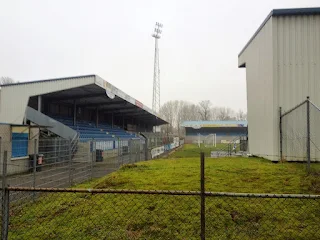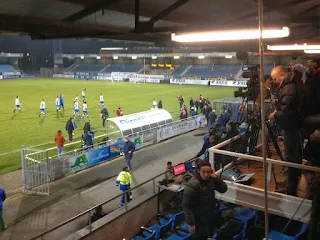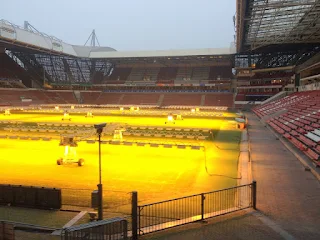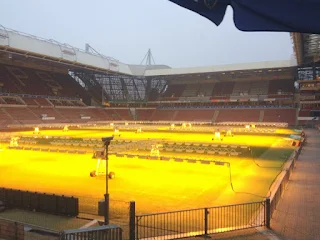FC Eindhoven is a professional club from the city of the same name, from the east of the Netherlands. The club was formed on the 16th November 1909, as EVV, or Eindhovense Voetbal Vereniging, five years before neighbours PSV, starting out playing in the regional Brabantse Voetbalbond.
By 1912-13 EVV had joined the NVB national competition as a team in the Derde, third klasse. Promotion was won in their second season where a couple of runners-up spots came in 2E Klasse B before they lifted the league title in 1921-22.
This came after the club merged with local side Gestel at the start of the season to become EVV Eindhoven. The promotion placed the club in Eerste Klasse Zuid, one of five regional divisions, from which each winner played in a group to decide the Dutch champions.
The team finished as Zuid runners-up in 1931-32, prior to moving to their home ground at Aalsterweg in 1934. 1936-37 saw the first honour arrive at the club as they lifted the KNVB Cup by defeating De Spartaan 1-0.
In 1938-39 Eindhoven finished fourth in the championship play-off after winning the Zuid title prior to finishing regional runners-up the following season. The 1941-42 campaign saw another Zuid championship before finishing as Dutch runners-up.
The championship was extended post War to include six regional sections with EVV finishing Eerste Klasse Zuid I runners-up in 1947-48 followed by another second place in the streamlined competition in Eerste Klasse E.
The competition was cut to four sections in 1951-52 with EVV coming second in Eerste Klasse C before winning the Klasse D title in 1952-53 before ending as national runners-up. Eindhoven retained their Klasse D top spot before being crowned as national champions in 1953-54 under coach Wim Groenendijk.
Throughout this period EVV were the biggest club in the city as they competed in the Lichtstad, or City of Light Derby. The club provided Dutch internationals Noud van Melis, Frans Tebak and Dick Snoek as professional football was introduced in the Netherlands.
The goals of Jan Louwers helped Eindhoven to the Eerste klasse D in 1954-55 before the competition was cut to two Hoofdklasses the following season so to get to one national Eredivisie for 1956-57 Eindhoven finished bottom and were relegated to the Eerste Divisie.
A sixth place in 1961-62 in section A under coach Jan Bijl was timed well to allow Eindhoven to maintain their status as the division was cut to one section for the following season. The team comfortably held their own for many seasons before being relegated in 1968-69.
English coach Lesley Talbot was appointed to try and restore Eindhoven’s status with his side finishing third in 1970-71 which was enough to restore Eerste Divisie football. Hans Alleman took over as coach for a season before being replaced by Rinus Gosens.
The goals of Anton Jacobs helped the side to promotion to the Eredivisie via the play-offs in 1974-75. Their spell lasted two seasons before being relegated in 1976-77 where future international Cees Schapendonk scored the goals upon their Eerste Divisie return.
The team drifted along in mid table before finishing bottom of the table in 1984-85 at which point EVV took the decision to become an amateur club, but a new professional club SBV Eindhoven; Stichting Betaald Voetbal Eindhoven was formed to replace them while retaining the old clubs league position.
League placings improved year on year with coach Jacques de Wit in his third spell at the club taking his side to fifth place in 1989-90 before Mario Verlijsdonk’s side missed out on promotion via the play-offs twelve months later.
It was the same result in 1991-92 with Chris Dekker in charge of the team with the next unsuccessful play-off campaign for promotion coming under the tutelage of Willem Leushuis in 1997-98 before the club changed their name to FC Eindhoven in 2002. In 2004 the club set up a deal with PSV to allow the swapping of youth players between the clubs.
2009-10 saw FC Eindhoven under head coach, former Dutch international Jan Poortvliet, reach the end of season play offs, but they were defeated 3-2 on aggregate by Willem II. In 2011-12 they narrowly missed out on promotion as they ended in third place with Ernest Faber at the helm.
Jean-Paul de Jong arrived at the Jan Louwers Stadion in the summer of 2013 after a poor previous campaign saw the team finish third from bottom of the table. His side reached the play-offs in 2013-14 where they were defeated by Sparta Rotterdam.
A league runners-up spot followed in 2014-15 but FC Volendam came out on top in the play-offs. Mitchell van der Gaag took over as coach in the summer of 2015 as the goals of Jinty Caenepeel took Eindhoven back to the play-offs which ended in defeat to NAC Breda.
Mart Lieder finished as the league top scorer in 2017-18 under coach Wilfred van Leeuwen who was then replaced by David Nascimento. Eindhoven, coached by former international Ernie Brandts were in thirteenth place when the COVID-19 pandemic abandoned the 2019-20 season.
FC Eindhoven will play in the Eerste Divisie in the 2020-21 season.
My visit


























































